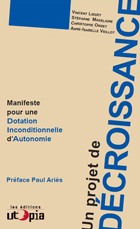On Friday, November 27, 2015, Vincent Liegey, co-authors of a Degrowth Project and coordinator of the next international Degrowth Conference in Budapest gave a lecture at the Central European University: Introduction to Degrowth, From the Deconstruction of our Addictions to Growth Toward a Degrowth Project.
Degrowth is many things. It is, according to Vincent Liegey, spokesperson for the French Degrowth Movement, a « bomb word » that often prompts heated discussions. It is also, he went on to explain, a multidimensional, interdisciplinary field of research that seeks to deconstruct the growth paradigm. Liegey noted that although some people in some parts of the world have benefited enormously from growing economies in recent decades, many of these same people don’t feel that they are living meaningful lives. « Maybe we’re not as rich as we think we are, » he said. Liegey noted also that within these societies, there are glaring and growing inequalities that suggest that growth is not the solution to all of our problems as some people claim it is.
The Degrowth Movement has emerged during the last decade to question the widely held belief that economic growth is always desirable. It wants to encourage and promote a « transition to new models of society, » Liegey said. As he stressed in his presentation at the School of Public Policy at Central European University on November 27, there are compelling reasons to question our « many addictions to growth » today. Infinite growth on a planet with finite resources makes no sense, said Liegey. « We need to question what we do. Is it sustainable? Is it meaningful? »
One of the distinctive features about the Degrowth Movement is that it is organized around horizontal networks. The goal is for individuals to be able to re-appropriate their work, and to be free of the compulsion to consume, he said. Liegey said that the movement encourages experimentation with new grassroots economic models that enable people to engage with meaningful activities, and to reassert control over their lives. « There is a silent transformation of society coming from the grassroots level, » he said, noting that « solutions exist locally. » Liegey said that it was important to collect « these grassroots initiatives » but that we must also « respect their uniqueness. »
As Liegey noted, there are enormous frustrations in society today that lead many people to feel alienated and isolated. To address this situation the movement has launched the « Degrowth Project, » calling for the implementation of an unconditional basic income (UBI) plan. Liegey explained that UBI would enable people to experiment, reflect on their lives, and « connect the dots. » He argued forcefully that societies had the economic resources to implement a UBI plan. What was lacking was « political will, political vision, and social pressure. »
This is a theme that Liegey returned to often during his presentation, and in the Q&A session that followed: that we have more options than we think we do, and that it is possible to restructure the ways in which we live and work. What we lack are not resources, but the time and opportunity to question and come up with alternatives to the way that too many of us live today: addicted to a way of life that is not meaningful to us individually, or sustainable for the planet.
Source: CEU website – thanks to them.



